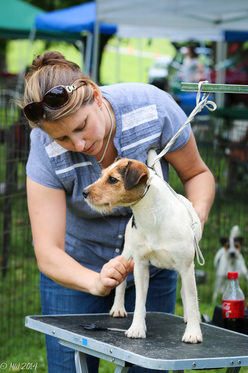Health & General Care
What do you recommend in terms of food and supplements?
 click to enlarge
click to enlarge
I feed and recommend Dr. Tim's brand dog food. This premium all natural food contains the proper nutritional balance in a very concentrated form, and the dogs love it. Although it may cost more per bag than most supermarket brands, you will feed less per meal.
I would avoid a supermarket brand, as most of these require that you feed almost twice the amount compared to a super premium brand. Helpful hint: the more they eat, the more they poop! Feeding less makes house training easier.
I would avoid a supermarket brand, as most of these require that you feed almost twice the amount compared to a super premium brand. Helpful hint: the more they eat, the more they poop! Feeding less makes house training easier.
What about hereditary health issues?
The JRTCA maintains stringent guidelines for registration. Unlike other registries that register the entire litter at birth, the JRTCA registers individual terriers upon their own merit when they reach one year of age. Part of this registration process is a thorough vet exam to rule out certain hereditary defects. As a result, Jack Russells have fewer health problems than many other breeds.
Our club's breeders are generally very proactive regarding the health of this special breed. Terriers used for breeding are BAER tested to rule out heredity deafness, and are examined by a Certified Canine Ophthalmologist annually to rule out certain eye problems. Additionally, The Jack Russell Terrier Research Foundation, in conjunction with the University of Missouri, has been instrumental in helping to identify the genes responsible for several serious hereditary diseases in the last few years. This is huge (for many dog breeds), and makes it possible for responsible breeders to test their stock with a simple cheek swab kit, and never, ever have to take a chance on producing a dog with one of these maladies again. An online Health Registry has recently been set up where you can check for posted test results.
Our club's breeders are generally very proactive regarding the health of this special breed. Terriers used for breeding are BAER tested to rule out heredity deafness, and are examined by a Certified Canine Ophthalmologist annually to rule out certain eye problems. Additionally, The Jack Russell Terrier Research Foundation, in conjunction with the University of Missouri, has been instrumental in helping to identify the genes responsible for several serious hereditary diseases in the last few years. This is huge (for many dog breeds), and makes it possible for responsible breeders to test their stock with a simple cheek swab kit, and never, ever have to take a chance on producing a dog with one of these maladies again. An online Health Registry has recently been set up where you can check for posted test results.
First veterinary visit? And how often do you recommend check-ups?
 click to enlarge
click to enlarge
According to the terms of the Purchase Agreement, you should have your new puppy checked by your vet within three days. I will let you know at the time of purchase when the puppy’s next shots are due according to his health record at the time. We suggest that you do some research regarding vaccination schedules as the recommendations have changed over the last few years.
As far as frequency of regular check-ups, that is something you should discuss with your veterinarian.
As far as frequency of regular check-ups, that is something you should discuss with your veterinarian.
At what age do you recommend spaying/neutering my pet puppy?
That is something you should discuss with your veterinarian, but most seem to suggest spaying/neutering at around six months of age. Some recent research suggests that waiting until the dog is fully mature and finished with it's skeletal growth can help prevent certain performance type injuries later in life.
According to the terms of the spay/neuter clause in our Pet Purchase Agreement, we require the terrier to be sterilized before one year of age. However, for those specifically interested in the performance sports will consider making an exception to this on a case by case basis.
According to the terms of the spay/neuter clause in our Pet Purchase Agreement, we require the terrier to be sterilized before one year of age. However, for those specifically interested in the performance sports will consider making an exception to this on a case by case basis.
What are the basic grooming requirements for Jack Russells and what supplies will I need?
A slicker brush, an undercoat rake or stripping comb/knife, and nail clippers or a grinder should do it. Whether you own a smooth coat or a rough/broken coat, weekly brushing and biweekly nail trimming and ear cleaning will be your basic routine. During times of seasonal shedding (spring and fall), your terrier may require more frequent grooming. Bathing is rarely necessary unless your terrier meets up with a skunk or rolls in something really smelly—unfortunately something they seem to thoroughly enjoy! In a terrier with the correct coat texture, dirt will readily brush out once it is dry.
What are the different grooming considerations for pet dogs vs show dogs or working dogs?
 click to enlarge
click to enlarge
All terriers need to have the dead hair removed periodically through regular brushing/raking of the coat. This helps keep the coat thick and harsh, which is equally important for a working dog or a family pet as a correct coat provides protection from the elements.
Grooming for the show ring is a bit more involved. It requires periodic hand stripping and trimming of the coat to maintain a clean outline. Shaving with electric clippers is never recommended as it harms the proper texture of the coat, reducing its ability to repel dirt and water and protect the terrier from the elements.
To learn proper stripping techniques for both novice and experienced groomers alike, you can order the Grooming the Jack Russell Terrier for Companionship, Work, and Show video produced by Canine Training Systems.
